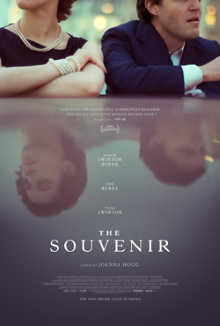
This is the first film by Joanna Hogg that we’ve watched and she is an up and coming British director whose name often pops up. But it’s also notable as the first significant performance by Honor Swinton Byrne who plays the lead here while her mother Tilda Swinton takes on a supporting role as the main character’s mother. Unfortunately I don’t like it much as it feels so indirect and seems to leave so much unsaid. Then after reading how it’s at least partially autobiographical on Hogg’s part, it’s easier to understand how painful it must have been to confront these issues head on.
Julie is a young film student from a privileged background who wants to make a film about a working class family in Sunderland. Yet the course of her life is derailed when she befriends Anthony, an older man who says he works for the Foreign Office., after he helps her view the painting The Souvenir from which the film gets its name. When he asks to temporarily stay in her apartment but refuses to give a reason, hinting that it has something to do with his work which is a state secret, she acquiesces. This arrangement soon becomes permanent, punctuated by Anthony’s occasional absences when he claims he has work to do, and they eventually become lovers. Anthony takes to borrowing money from her and Julie’s own studies are neglected as she devotes more of herself into the relationship. As time passes, she is forced to confront the fact that Anthony is both a heroin addict and a thief and yet she seems to be unable to break it off with him. This leads her to drastically change as an artist as her film project switches subject to a more personal, and arguably more authentic, one.
After a brief moment of confusion at the beginning as the inexperienced yet idealistic Julie struggles to find her footing, the film soon coalesces around the toxic relationship between Julie and Anthony. As audiences, we think we know what to expect out of this kind of drama, yet The Souvenir surprises us, and not in an entirely good way, as this film steadfastly refuses to show us the most pivotal moments on camera. Instead, Hoggs uses a technique that is akin to defining negative space, filming the moments that surround the most dramatic conflicts, so that we can guess what has happened, without letting us see them directly. For example, we are shown a scene where Julie accuses Anthony of being a thief without knowing how she found out and then it is cut just when we expect the confrontation to come to some resolution. Similarly at some point, Julie’s parents seem to have realized that Julie and Anthony are lovers and that he is trouble but we never get to see their reactions. This admittedly feels quite novel, but is immensely frustrating as we feel that we are being constantly teased without being offered catharsis and have to keep trying to work out what has happened from the context.
Hogg’s decision to film it this way is easier to sympathize with if we accept this as her way of dealing with her personal trauma without confronting it head-on. Yet this also means that this is a film that she has made only for herself and no one else. Consider the large, ornate bed that Julie and Anthony share and that replaces the small bed that she previously owned. In interviews, Hogg explains that this is the real bed that she and her lover bought at a flea market one day and that in fact the apartment is full of many other objects from her own, real relationship. Yet we the audience are never shown this scene and simply have to accept it suddenly showing up. Obviously this is strongly significant to the director, but how are we meant to have any emotional reaction to it? We are not even granted the inside perspective and knowledge that Julie must have had. We don’t know if Anthony really does work for the Foreign Office as he says, or what her new student film is actually about or what happened during their trip to Venice. It’s hard for the audience to stay emotionally invested when the film deliberately leaves us in the dark.
Finally, casting Honor Swinton Byrne does work rather well as the role here takes advantage of her seeming inexperience and lack of confidence. However I’m not sure that she has much lasting star power as she has nowhere near the screen presence of her mother. As for the film, it is interesting in how it’s so intensely personal for the director herself but it seems to shut the audience out completely and hence doesn’t appeal to me at all.